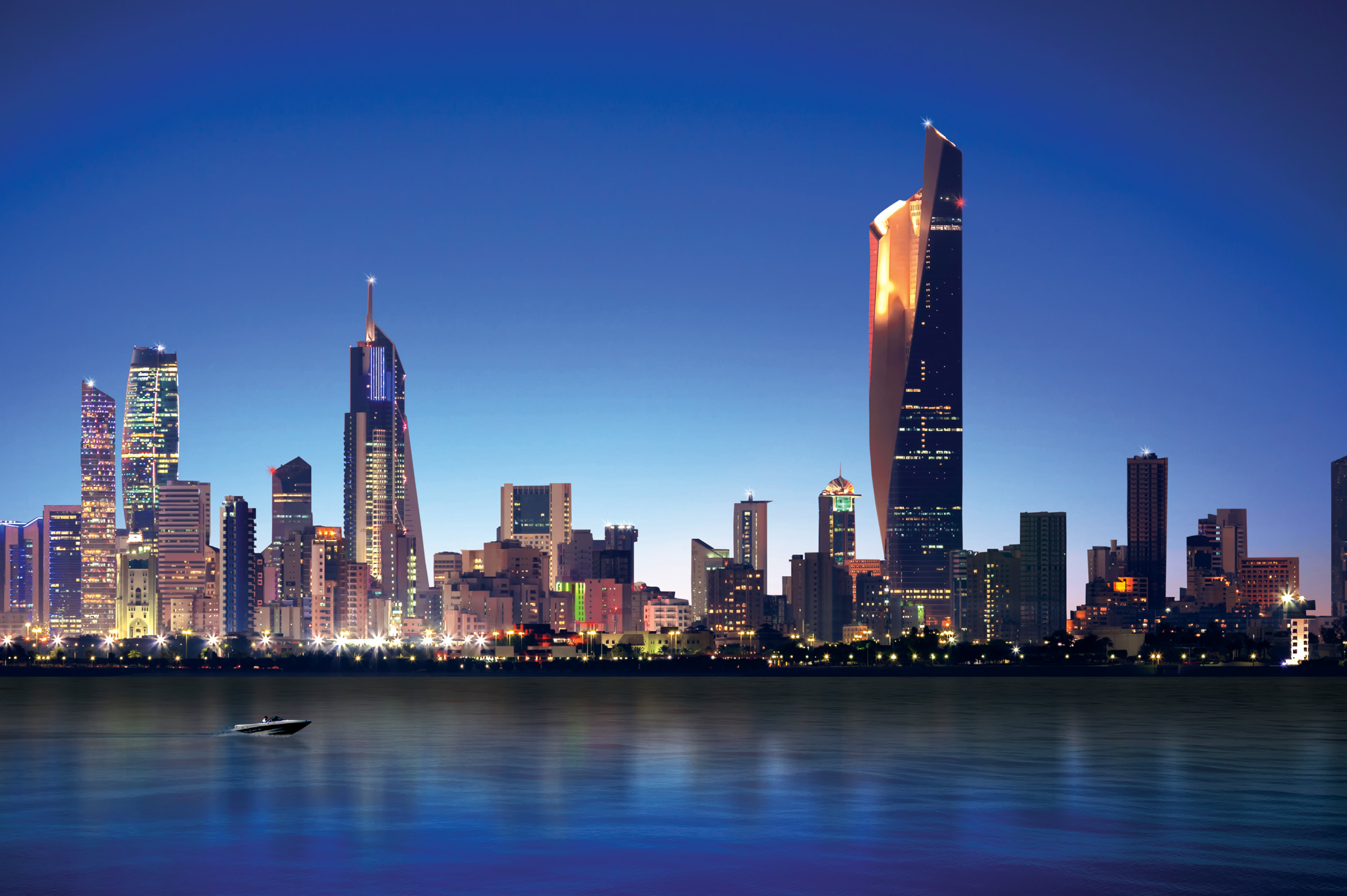There isn’t an Arabic equivalent to the saying: Fix the roof while the sun is shining. The sun almost always shines in Kuwait – annual rainfall is, on average, just three precious inches. Consequently, Kuwait has led the world in the development of efficient desalination techniques which now supply the country’s 2.9 million inhabitants with clean water.
Kuwait, once a tiny collection of settlements at the northern tip of the Persian Gulf, earned its living from fishing and boat-building. Kuwaiti seamanship was renowned throughout the Arab world. Then, in 1931, oil was discovered under the arid sands, and the little sheikhdom suddenly found itself very rich indeed.
There is an appropriate Arabic proverb – wealth comes like a turtle, but runs away like a gazelle. In Kuwait the turtle arrived quite quickly, but everyone is acutely aware of the date and time that the gazelle will make a run for it. While there are an estimated 96.5 billion barrels of oil still to be extracted, it will eventually run out; the current guess is within a century.
Kuwaitis are proud of their country’s reputation for ingenuity and skill, whether in boat-building, desalination, or oil extraction. The problem is that Kuwait – the fourth richest state on the planet – while knowing that its reliance on oil must end, is pretty comfortable right now, and there’s always a temptation to put off difficult jobs until tomorrow.
Kuwait runs a healthy current account surplus, holds almost 10% of the world’s oil reserves, the Kuwaiti dinar is the highest-valued currency unit in the world – but 95% of government income is derived from oil exports. Diversification is the buzz word, but the economic reforms needed to push the country towards that goal are being hampered by constant squabbles between parliament and the all-powerful ruling dynasty – the Al Sabah family.
Before the Iraq invasion of 1990, the rest of the world considered Kuwait to be a cutting-edge state; a liberated, technologically-advanced, open Muslim society which was welcoming and business-friendly. Indeed, it was seen to be at the forefront of the development of the “virtual state” – tiny in terms of its land mass, but a giant in the new climate of globalisation.
When Iraqi tanks rolled into Kuwait in August 1990, for instance, the invaders made for the country’s financial institutions to try to grab its wealth. Richard Rosecrance, in his book The Rise of the Virtual State describes how outdated the notion is that wealth can be physically captured by an act of war. “Capital and information can slip away like quicksilver after an attack,” he writes. “The Iraqi Army ransacked the computers in downtown Kuwait City, only to find that the cash in bank accounts had already been electronically transferred.”
Some of that cash, billions of dollars’ worth, was used to mount an international campaign of resistance and helped fund the fight back. But one cannot underestimate the paralysing effect the invasion had on Kuwait. For seven months the population was under a brutal occupation by Iraqi forces who vandalised the economic structure and carried out untold atrocities.
Recovery
Unsurprisingly, Kuwait has taken a long time to recover from the shock of invasion. Even after the success of Desert Storm – the liberation of Kuwait by an American-led coalition of international forces – Kuwait existed for a decade in an uncomfortable stasis which smothered development. Saddam was defeated, but still bellicose. It wasn’t until the invasion of Iraq in 2003, and the final removal of its dictator, that Kuwait could relax and begin thinking of the future.
Even today, commentators detect an underlying hesitancy in Kuwait. The hangover effects of invasion meant that, throughout the 1990s, the economy seemed to just bumble along while fellow Gulf states like Dubai, Qatar, Abu Dhabi, and the UAE picked up the pace.
Kuwait today finds itself struggling to develop an adequate structure to encourage and promote private enterprise, and so diversify its economy from almost total reliance on oil revenue. Approximately 90% of working-age Kuwaitis are employed in the public sector, where salaries are traditionally high. This doesn’t mean there isn’t a flourishing private sector – it’s just that its workforce is made up mainly of non-Kuwaitis.
The IMF believes that Kuwait’s economy needs to be restructured and reformed – particularly its reliance on the public sector. IMF observers say this is a problem for Kuwait’s future economic security; that the strength of the sector was stifling the development of a healthy, diversified private sector.
Government salaries are famously large – and annual increases tend to far outstrip inflation, currently running at around 2.5%. A government worker can retire before his 50th birthday, and can expect a handsome pension, despite the fact that life expectancy for men is 74 years.

Nevertheless, according to the Kuwait Times in 2014, the country was experiencing “an extraordinary rise in entrepreneurship and small business start-ups.” It called the phenomenon “souk culture” – a reference to the Arabic open-air markets that exist across North Africa and the Middle East.
Souk culture – the rapid growth of the “informal economy” – is due in part to Kuwait’s tough laws on starting a business. In order to get an official licence, new businesses, for instance, must already possess a physical building from which to operate. The licensing process is long and frustrating. It seems to make little sense for an educated Kuwaiti to put himself to all that trouble when there are plenty of cushy government jobs available.
The trend for unofficial trade, though, appeals to the younger members of the Internet-savvy generation, who are using social media to sell wares – from cupcakes to computer repair services. Some subsequently avoid not just officialdom and bureaucracy, but also taxes – not a big problem for a state as rich as Kuwait, but in a diversified future, a sensible and robust system of taxation will be necessary and it would be better to tackle tax evasion before it becomes an ingrained habit.
Democratic
Politically Kuwait is seen as one of the most democratic of the Gulf states – though there are rumblings of discontent. While never reaching the boiling point of the Arab Spring revolts elsewhere, political opposition to the ruling family is growing. There is now a broad coalition of opponents who are demanding full parliamentary democracy and widespread reform.
These reforms are essential, they say, if Kuwait is to regain its regional prestige – though the country is playing catch-up, building two massive waterside developments to match the glitz of other Gulf states down the coast.
The opposition complains that Kuwait’s oil wealth has been plundered by corrupt officials, the justice system is unfair, and human rights are disregarded. Their demands, which include radical changes to the country’s constitution, would greatly diminish the power of the emir, Sheikh Sabah al-Ahmed al-Jaber al-Sabah. He has ruled Kuwait since 2006 – and shows no signs of relaxing his grip on the reins.
But while this wrangling between parliament and the ruling family continues, no-one is actually fixing the roof – and those dark rain clouds are inching ever closer.































